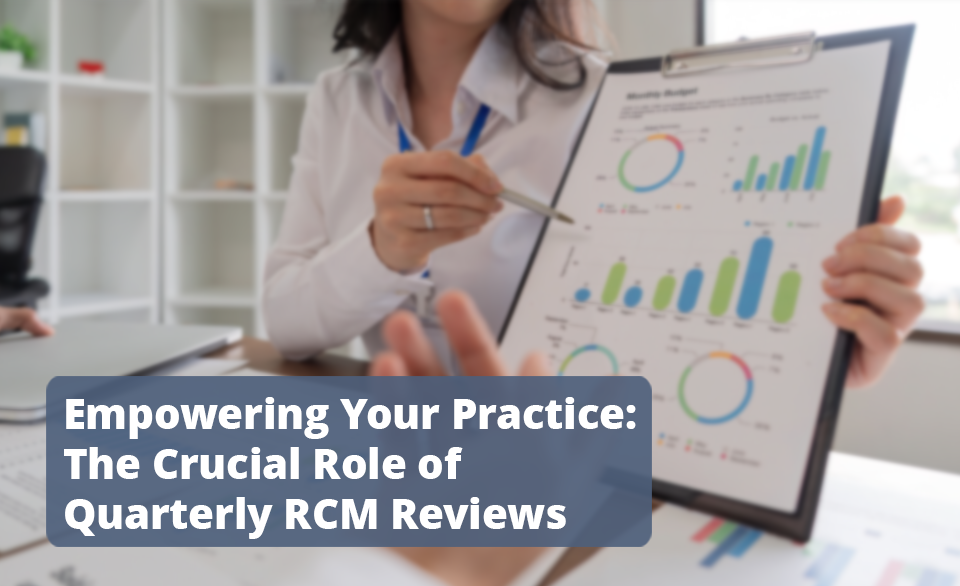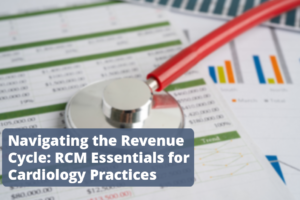Empowering Your Practice: The Crucial Role of Quarterly RCM Reviews

The Significance of Quarterly RCM Reviews
Quarterly Revenue Cycle Management (RCM) reviews play a critical role in the financial health of healthcare practices. These reviews offer a systematic approach to assessing and enhancing revenue cycles, identifying inefficiencies, and ensuring compliance with current regulations.
Enhancing Financial Health
Quarterly RCM reviews enhance the financial health of a practice by analyzing key performance indicators and financial metrics regularly. This consistent oversight allows healthcare professionals to adjust strategies proactively, improving overall profitability.
| Financial Metric | Target Value | Current Value | Difference |
|---|---|---|---|
| Net Revenue | $500,000 | $475,000 | -$25,000 |
| Days in Accounts Receivable | <30 days | 45 days | +15 days |
| Claim Denial Rate | <5% | 7% | +2% |
Regular assessments through quarterly reviews can assist in identifying trends, enabling practices to make informed decisions that enhance financial management.
Identifying Revenue Leakages and Inefficiencies
The importance of quarterly RCM reviews also lies in their ability to identify revenue leakages and areas of inefficiencies in the revenue cycle. Analyzing claims data, payment patterns, and denial rates can reveal flaws in the billing process that may otherwise go unnoticed.
For instance, a review may uncover frequent issues in specific services leading to high denial rates, as illustrated in the table below:
| Service Type | Total Claims | Denials | Denial Rate |
|---|---|---|---|
| X-Ray Services | 200 | 30 | 15% |
| Lab Tests | 150 | 10 | 7% |
| Office Visits | 300 | 20 | 6.67% |
Addressing these inefficiencies not only recovers lost revenue, but also improves patient satisfaction by streamlining claims processing times.
Ensuring Compliance with Regulations
Lastly, quarterly RCM reviews are essential for ensuring compliance with the multitude of healthcare regulations that govern billing and coding practices. Regular evaluations help practices stay informed about changes in regulations, minimizing the risk of audits and penalties.
During these reviews, it’s crucial to assess adherence to standards set forth by organizations such as the Centers for Medicare & Medicaid Services (CMS). This involves verifying that all patient documentation and claim submissions meet current regulatory requirements.
By integrating these three significant aspects into the quarterly review process, healthcare professionals can optimize the overall revenue cycle, safeguarding the financial well-being of their practices.
Optimizing Revenue Cycle Management
An effective revenue cycle management (RCM) process is vital for the financial success of healthcare practices. Quarterly RCM reviews play a crucial role in identifying areas for improvement and ensuring ongoing operational efficiency. This section discusses the key components of quarterly reviews, their benefits, and strategies for optimizing revenue cycle management.
Key Components of Quarterly RCM Reviews
During a quarterly RCM review, several essential components must be addressed to gain a comprehensive understanding of financial performance. These components include:
| Component | Description |
|---|---|
| Financial Metrics | Analysis of key performance indicators (KPIs) such as collections, denials, and claims processing times. |
| Compliance Checks | Verification that billing practices comply with relevant regulations and standards. |
| Staff Training Needs | Assessing if staff require training to enhance their roles in the revenue cycle. |
| Patient Demographics | Reviewing changes in patient demographics that may impact revenue. |
Thorough preparation of data is essential for an accurate and insightful review.
Benefits of Regular Reviews
Conducting regular quarterly RCM reviews provides numerous advantages for healthcare practices. Some of the key benefits include:
| Benefit | Description |
|---|---|
| Improved Cash Flow | Regular evaluations help identify revenue opportunities, leading to better cash flow management. |
| Enhanced Operational Efficiency | Identifying inefficiencies allows practices to streamline operations and reduce costs. |
| Proactive Issue Resolution | Early detection of potential problems enables timely interventions. |
| Strategic Planning | Insights gained from reviews assist in strategic planning and adjustments. |
Strategies for Effective Revenue Cycle Management
To maximize the benefits of quarterly RCM reviews, healthcare practices should implement strategies that foster effective revenue cycle management. These strategies may include:
| Strategy | Description |
|---|---|
| Engage Staff in the Process | Involving staff in review sessions enhances ownership and accountability. |
| Utilize Technology Tools | Leverage software solutions to streamline data collection and analysis efforts. |
| Conduct Comparative Analysis | Performing comparative RCM analysis helps identify performance gaps against industry benchmarks. |
Incorporating these strategies into quarterly RCM reviews enables healthcare professionals to optimize their revenue cycle management effectively and ensure the financial health of their practices.







